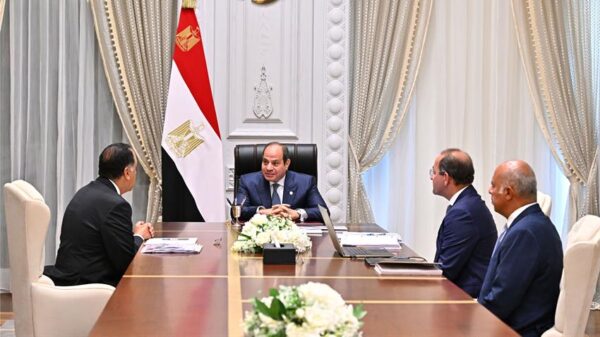Egypt recorded a historic primary surplus of 629 billion EGP (12.6 billion USD), representing 3.6% of GDP, an increase of 80% compared to the 2023/2024 fiscal year, which stood at 350 billion EGP (7 billion USD). This was revealed in a statement published on August 16, 2025 by the presidency, which also announced a meeting between President Abdel Fattah Al-Sissi, Prime Minister Mostafa Madbouly, and Finance Minister Ahmed Kajouk to review the preliminary budget indicators for the 2024/2025 fiscal year.
This performance was achieved despite a significant decrease in revenues from the Suez Canal, with revenues dropping by 60% compared to forecasts, resulting in an estimated loss of 145 billion EGP (2.9 billion USD).
An increase in tax revenues without new charges
The Finance Minister indicated that this improvement in public accounts was accompanied by an increase in private investments, the dynamism of the manufacturing sector, and a rise in exports. Tax revenues surged by 35%, reaching 2,204 billion EGP (44.1 billion USD). This development is the result of expanding the tax base, increased use of digital solutions, and incentives aimed at enhancing voluntary taxpayer compliance.
Furthermore, the first phase of the tax relief program (February – August 2025) mobilized 77.9 billion EGP (1.56 billion USD), through 401,929 tax dispute settlements and over 650,000 voluntary tax declarations.
Priority to social spending and budget discipline
Regarding social programs, the state covered the contributions of the most vulnerable beneficiaries to the universal health insurance system for an amount of 2.3 billion EGP (46 million USD). In the education sector, 160,000 teachers were recruited at a cost of 4 billion EGP (80 million USD), while 6.25 billion EGP (125 million USD) were allocated to school canteens and full meals for students, contributing to the fight against malnutrition.
President Al-Sissi reiterated the need to maintain strict budget discipline and strengthen partnerships between the state and the private sector. He emphasized that reducing the debt burden and financing social programs such as Takaful and Karama, as well as priority sectors like health and education, remained at the core of the government’s strategy, with the goal of alleviating pressures on households and promoting greater social justice.


